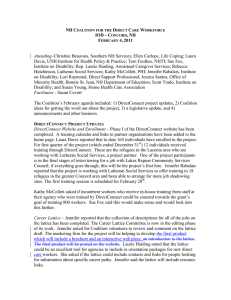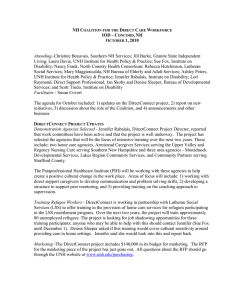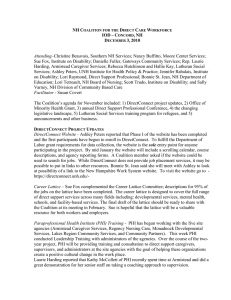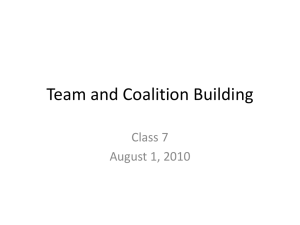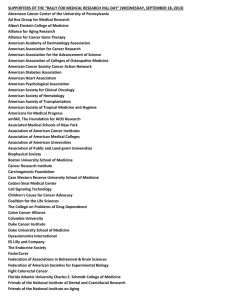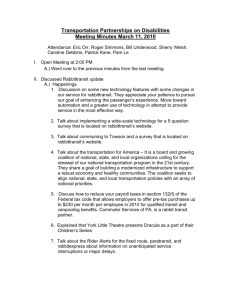NH C D W
advertisement
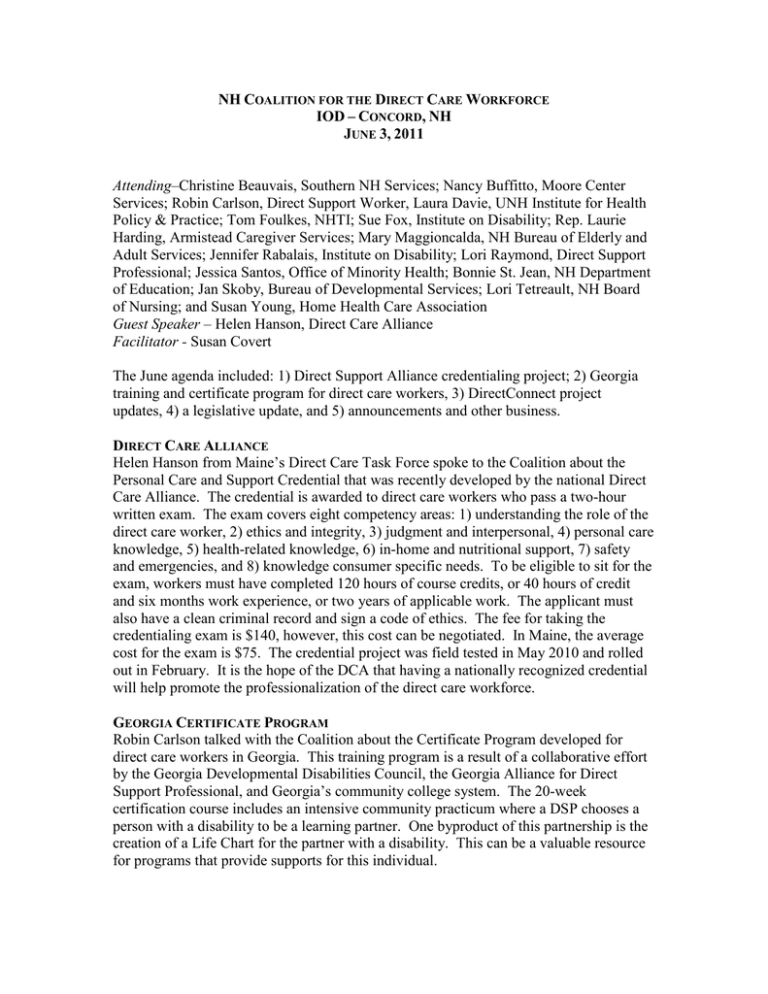
NH COALITION FOR THE DIRECT CARE WORKFORCE IOD – CONCORD, NH JUNE 3, 2011 Attending–Christine Beauvais, Southern NH Services; Nancy Buffitto, Moore Center Services; Robin Carlson, Direct Support Worker, Laura Davie, UNH Institute for Health Policy & Practice; Tom Foulkes, NHTI; Sue Fox, Institute on Disability; Rep. Laurie Harding, Armistead Caregiver Services; Mary Maggioncalda, NH Bureau of Elderly and Adult Services; Jennifer Rabalais, Institute on Disability; Lori Raymond, Direct Support Professional; Jessica Santos, Office of Minority Health; Bonnie St. Jean, NH Department of Education; Jan Skoby, Bureau of Developmental Services; Lori Tetreault, NH Board of Nursing; and Susan Young, Home Health Care Association Guest Speaker – Helen Hanson, Direct Care Alliance Facilitator - Susan Covert The June agenda included: 1) Direct Support Alliance credentialing project; 2) Georgia training and certificate program for direct care workers, 3) DirectConnect project updates, 4) a legislative update, and 5) announcements and other business. DIRECT CARE ALLIANCE Helen Hanson from Maine’s Direct Care Task Force spoke to the Coalition about the Personal Care and Support Credential that was recently developed by the national Direct Care Alliance. The credential is awarded to direct care workers who pass a two-hour written exam. The exam covers eight competency areas: 1) understanding the role of the direct care worker, 2) ethics and integrity, 3) judgment and interpersonal, 4) personal care knowledge, 5) health-related knowledge, 6) in-home and nutritional support, 7) safety and emergencies, and 8) knowledge consumer specific needs. To be eligible to sit for the exam, workers must have completed 120 hours of course credits, or 40 hours of credit and six months work experience, or two years of applicable work. The applicant must also have a clean criminal record and sign a code of ethics. The fee for taking the credentialing exam is $140, however, this cost can be negotiated. In Maine, the average cost for the exam is $75. The credential project was field tested in May 2010 and rolled out in February. It is the hope of the DCA that having a nationally recognized credential will help promote the professionalization of the direct care workforce. GEORGIA CERTIFICATE PROGRAM Robin Carlson talked with the Coalition about the Certificate Program developed for direct care workers in Georgia. This training program is a result of a collaborative effort by the Georgia Developmental Disabilities Council, the Georgia Alliance for Direct Support Professional, and Georgia’s community college system. The 20-week certification course includes an intensive community practicum where a DSP chooses a person with a disability to be a learning partner. One byproduct of this partnership is the creation of a Life Chart for the partner with a disability. This can be a valuable resource for programs that provide supports for this individual. Members of the Georgia Alliance are coming to New Hampshire to talk with the Training Collaborative and representatives from our Community College system about this certification program. Jan Skoby said the Bureau is considering making this type of training a focus for the Training Collaborative. Tom Foulkes of NHTI said in the current economy the challenge is to find a way to make this training financially sustainable. Laurie Harding said she hopes that there could be one core curriculum and a baseline certificate for caregivers working with different populations including: frail elders, people with developmental disabilities, and people with mental illness. Susan Young added that, ideally, this basic core training could be applied towards an LNA license. LEGISLATIVE UPDATE Representative Laurie Harding said that next week a Committee of Conference meets to resolve the State Budget, with the final budget going to the Governor by the end of June. At the moment, it appears that funding for developmental services will be back to the level of the Governor’s budget with some funding for the Wait List. Some funding also has been restored for ServiceLink. There will be significant cuts in the budget for mental health services, drug and alcohol treatment, the University system, Medicaid reimbursements for community hospitals, and supports for seniors living in congregate housing. Laurie noted that one positive outcome of the current budget crisis, may be an increased interest by community hospitals to work more collaboratively with other community providers to serve vulnerable populations. CONNECT PROJECT UPDATES DOL Commendation– Sue Fox informed the Coalition that, based upon a site visit in March and follow up visits in May, the Department of Labor has recognized the DirectConnect project for best practices in four areas: 1) the strength of its collaborative partnerships, 2) PHI peer mentoring program, 3) the apprenticeship program, and 4) a web based enrollment process. DirectConnect’s best practices will be featured in DOL’s report on ARRA funded projects. Coalition members posed for a photo that will be included in the report. Best Agency Practices - Sue said that in Year 2 the project will be identifying best practices by agencies to support direct care workers and will be looking for input on this from the Coalition. Agencies that have best practices for supporting direct care workers will be an agenda item for the Coalition’s October meeting. Outreach and Recruitment – Jennifer reported that Millennium is moving forward with the outreach and recruitment campaign for DirectConnect. DirectConnect brochures will be ready shortly and will be mailed to the Coalition. Millennium is also working with the Career Lattice team to create a brochure and interactive web piece of the lattice. This will be incorporated into the DirectConnect website, but will have the capability of being transferred to another website once the project is over. Scholarships – The project will be seeking a budget adjustment to increase funds for the scholarship program. This has been an extremely popular component of the program. Lutheran Social Services Vocational ESOL Training– The job shadowing component of this training has led to several unemployed participants finding employment. Lutheran Social Services, Community Bridges, Lakes Region Community Services and the Concord Regional VNA all participated as job shadowing sites and have currently hired a total of 9 workers through the project. OTHER BUSINESS Bonnie St. Jean reported that enrollment for next week’s New Hampshire Department of Labor conference to promote the New Hampshire Works System is nearly full. ACTION ITEMS – ALL COALITION MEMBERS – Begin noting best agency practices for supporting direct care workers. JENNIFER RABALAIS – 1) Send DirectConnect brochures to the Coalition, 2) put agency best practices on agenda for the October meeting. THE COALITION MEETS BI-MONTHLY. THERE ARE ALSO SEVERAL DIRECTCONNECT WORK GROUPS, PLEASE CONTACT JENNIFER RABALAIS IF YOU ARE INTERESTED IN JOINING A WORK GROUP 2011 CDCW MEETINGS DATES February 4th, April 1st, June 3rd, August 5th, October 7th, and December 2nd ALL MEETINGS WILL BE HELD FROM 1:00-3:00 AT THE IOD CONCORD OFFICE
